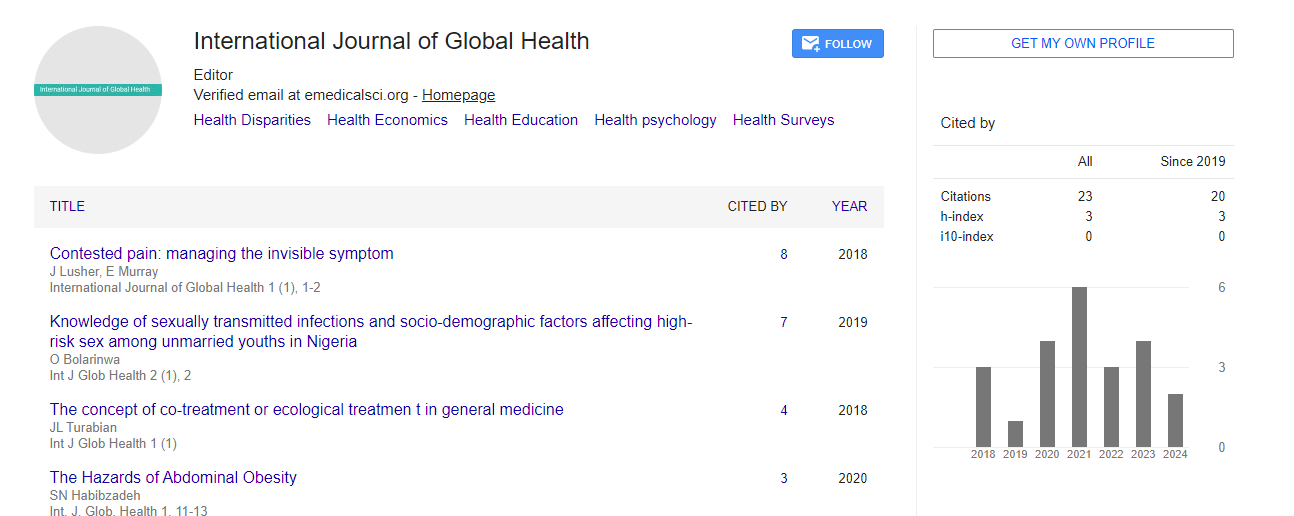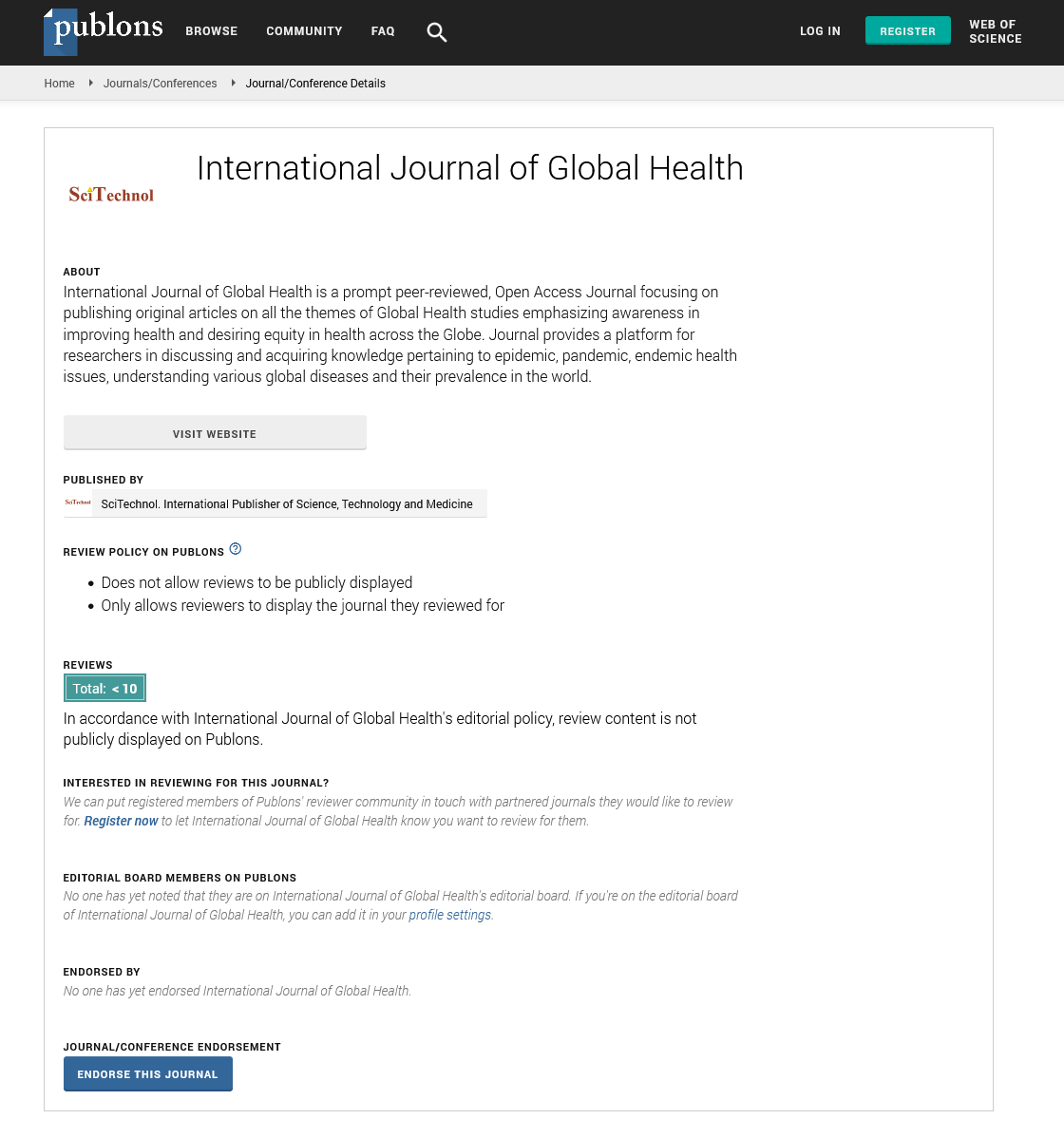Perspective, Int J Glob Health Vol: 6 Issue: 2
Pollution’s Insights for a Balanced Future
Zhiling He*
1Department of Global Health, Huazhong University of Science and Technology, Wuhan, China
*Corresponding Author: Zhiling He,
Department of Global Health, Huazhong
University of Science and Technology, Wuhan, China
E-mail: zhiling@he.cn
Received date: 24 May, 2023, Manuscript No. IJGH-23-107365;
Editor assigned date: 26 May, 2023, PreQC No. IJGH-23-107365 (PQ);
Reviewed date: 09 June, 2023, QC No. IJGH-23-107365;
Revised date: 16 June, 2023, Manuscript No. IJGH-23-107365 (R);
Published date: 23 June, 2023 DOI: 10.4172/Ijgh.1000185
Citation: He Z (2023) Pollution’s Insights for a Balanced Future. Int J Glob Health 6:2.
Description
Pollution has emerged as one of the most pressing challenges of the time, significantly impacting the environment and human health. Pollution studies play an important role in understanding the extent, sources, and consequences of pollution, guiding efforts towards sustainable solutions. This study will explore the significance of pollution studies, their methodologies, key findings, and their role in shaping environmental policies for a cleaner and healthier future.
Understanding pollution studies
Pollution studies encompass scientific research and investigations that aim to quantify, assess, and analyze the presence and effects of pollutants in the environment. These studies examine various types of pollution, including air pollution, water pollution, soil contamination, noise pollution, and hazardous waste. By systematically studying pollution, scientists and researchers can identify sources, measure concentrations, analyze impacts, and propose strategies for mitigation and prevention.
Methodologies in pollution studies
Pollution studies employ a range of methodologies to assess and measure pollution levels. Sampling and monitoring techniques are commonly used to collect data from specific sites or regions. Air pollution studies, for example, may involve the use of air quality monitoring stations that measure concentrations of pollutants in the atmosphere. Water pollution studies may collect water samples from rivers, lakes, or oceans to analyze the presence of contaminants. Additionally, modeling techniques and remote sensing technologies provide valuable insights into the dispersion and movement of pollutants in the environment.
Key findings and insights
Pollution studies have yielded significant findings that have raised awareness and informed environmental policies. Some key insights include
Health impacts: Pollution studies have highlighted the adverse health effects of exposure to pollutants. Air pollution, for instance, has been linked to respiratory diseases, cardiovascular problems, and increased mortality rates. Water pollution studies have identified associations between contaminated water sources and waterborne diseases. Understanding these health impacts is necessary for developing effective preventive measures and promoting public health.
Environmental degradation: Pollution studies have shed light on the environmental consequences of pollution. They have documented the impacts of industrial activities, improper waste disposal, and agricultural practices on ecosystems and biodiversity. For example, studies have shown the detrimental effects of chemical pollutants on aquatic life, the degradation of habitats due to soil contamination, and the disruption of ecological balance caused by pollution.
Climate change: Pollution studies contribute to the understanding of the link between pollution and climate change. Emissions of greenhouse gases, primarily from the burning of fossil fuels, have been identified as a major contributor to global warming. These studies have revealed the detrimental effects of pollution on weather patterns, sea levels, and the overall stability of the planet’s climate system.
Informing environmental policies and regulations
Pollution studies play a vital role in shaping environmental policies and regulations. They provide scientific evidence and data to inform policy decisions, support the development of environmental standards, and drive efforts towards pollution reduction and prevention. Governments, international organizations, and regulatory bodies rely on the findings of pollution studies to establish guidelines, set emission limits, and implement pollution control measures. Furthermore, these studies help policymakers assess the effectiveness of existing policies and identify areas for improvement.
Promoting sustainable solutions
Pollution studies serve as a catalyst for sustainable solutions and innovations. By identifying pollution sources, assessing their impacts, and exploring alternative practices, these studies contribute to the development of sustainable technologies and practices. For example, research on renewable energy sources and cleaner production processes helps reduce pollution levels and mitigate climate change. Pollution studies also inform waste management strategies, promote recycling, and encourage the adoption of environmentally friendly practices in industries and communities.
Challenges and future directions
Pollution studies face several challenges that need to be addressed to enhance their effectiveness
Data quality and availability: Ensuring accurate and comprehensive data collection is crucial for reliable pollution studies. Collaboration among researchers, standardized methodologies, and improved data sharing are essential for advancing the understanding of pollution and its impacts.
Emerging pollutants: Pollution studies must keep pace with the identification and assessment of emerging pollutants, such as microplastics, pharmaceuticals, and persistent organic pollutants. These pollutants present new challenges and require ongoing research to understand their sources, distribution, and impacts on the environment and human health.
Multidisciplinary approaches: Addressing complex pollution issues necessitates multidisciplinary collaboration. Pollution studies should involve experts from various fields, including environmental science, public health, engineering, and social sciences, to develop holistic solutions that consider both environmental and human dimensions.
Conclusion
Pollution studies are essential in understanding the extent, sources, and impacts of pollution on the environment and human health. By employing rigorous methodologies and data analysis, these studies generate valuable insights that inform environmental policies, promote sustainable solutions, and contribute to a cleaner and healthier future. As one continues to address the challenges posed by pollution, further investment in pollution studies and interdisciplinary collaboration will be instrumental in achieving sustainable development and preserving the well-being of the planet and future generations.
 Spanish
Spanish  Chinese
Chinese  Russian
Russian  German
German  French
French  Japanese
Japanese  Portuguese
Portuguese  Hindi
Hindi 
